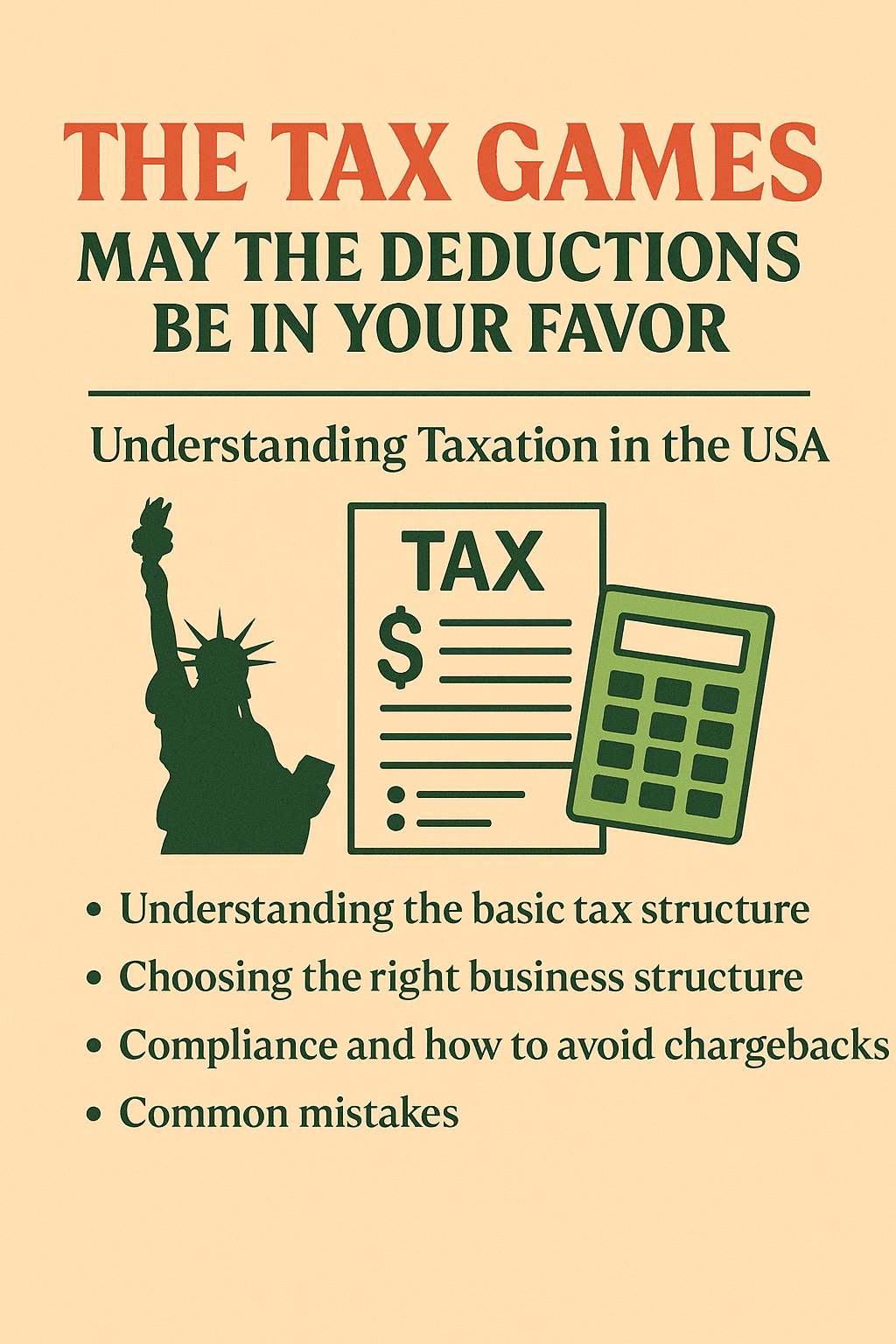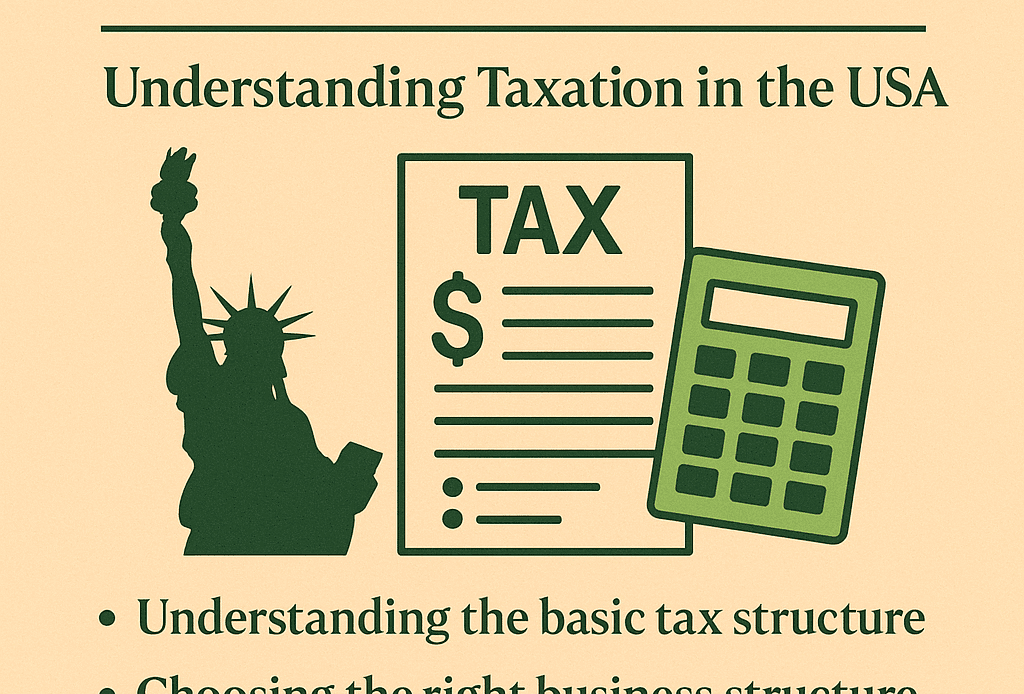The Tax Games are real — even after successfully launching your business in the US, you’re still wrestling with taxes, aren’t you? Let’s face it — whether you’re a startup tech founder or running a BPO offshore, taxation isn’t optional; it’s essential for survival.
Juggling between State Taxes, Federal Taxes, and then Trump throwing tantrums on top of everything? Let us help you navigate the chaos.

Understanding the Basic Tax Structure
The United States is a Federal Country, which means every State is a mini-country in its own under the umbrella of the US, hence the name- United States of America.
But what does a mini country and an umbrella country exactly mean here?
So, in a lay person’s language, we are supposed to pay taxes to two separate entities- to the Federal, i.e. the IRS (the one which issued your EIN- yes, that only), and then to the State, also known as SALT (State and Local Taxes).
(i) Federal Taxes- Corporate entities are taxed at flat 21%, which means whatever your profit is, you are supposed to pay 21% of it to the IRS ( which stands for Internal Revenue Service). Non-negotiable.
(ii) State Tax- On the State level, each state has its own Taxation policies- some charge state corporate income tax, some don’t. Other than that, some states also levy local taxes like:-
- Franchise Tax: Charged for the privilege of doing business in a State. Some states charge this, some don’t. For example- States like Delaware have a Franchise Tax irrespective of your revenue. While on the other hand, certain states like texas- charge it once you cross a particular economic threshold.
- SUTA: State Unemployment Tax, is State payroll tax which the employers pay to fund unemployment benefits for displaced workers. This works alongside FUTA (Federal Unemployment Tax). You are liable to pay both types of Taxes.
- Sales and Use Tax: Charge on goods and services sold, Even if you’re a non-resident, if you cross economic nexus thresholds (e.g., $50,000 sales or 100 transactions), you must collect and remit sales tax in that state.
Choosing the right business structure
Choosing the right business entity can change the way you are going to be taxed.
LLC- a form of partnership, partners are taxed on their personal filing.
While in a C-corporation, the company is a separate legal entity, all the taxation is dealt separately for the Company, you as an individual do not have to file individual returns.
As a foreigner in the US, it is advised that you establish a C-corp, not only for the taxation, but for other purposes as well.
To know more about LLC vs C-corp, read our blog- (backlink to llc vs c-corp)
The forms- Compliance and how to avoid chargebacks
Having a business in the US is a dream for many, and is appreciated as the benchmark of global expansion. And it is not solely because America is rich, but because it has one of the strictest compliance structures, which if failed, attract huge chargebacks.
Lets discuss two of the crucial forms required to be filled by you as a Non-resident business owner.
(i) Form 5472- Required for an entity owned by foreign individuals, with 25% or more stake in the company.
The main purpose of Form 5472 is for the government to monitor the flow of transactions between reporting entities and related parties. This ensures compliance with U.S. tax laws and helps combat financial crimes like money laundering and tax evasion.
Failure to do so can invite chargeback of $25,000
(ii) Form W-8BEN- for declaration of your foreign status to avoid unnecessary withholding.
(iii) State Tax Filings- Most states require an annual return or franchise tax filing, even if you have generated no revenue.
Myth– Assuming no revenue means no filing
Fact– Foreign owned entities have filing mandates regardless of activity or profit.
The IRS believes that silence is guilt. Hence, even if you ‘did not do any business- generated no profit’ you may still need to file.
Common Mistakes
Even full-grown businesses sometimes commit certain mistakes which attract huge chargebacks, leaving them to wonder- ‘what did I do wrong’
(i) Missing treaty benefits-
Tax Treaties like DTAA can reduce or eliminate double taxation- if you claim them properly
(ii) Ignoring State Filings-
In certain states you may still owe franchise tax. Apart from that, you need to maintain registered agent compliance.
(iii) Trying to DIY it all
Hiring a professional can reduce your burden immensely and add up to your gross profits in huge amounts. Trying to maintain tax and accounts would end up mixing your personal and professional finances, making the scenario even more complicated (as if the US Taxation is not complex enough).
Conclusion
Yes, U.S. taxation is complex. But it’s not something out of this world. With the right structure, filings, and strategy, you can legally minimize taxes, maximize profit, and run your business with confidence.
Taxes aren’t just about paying- they’re about planning, which is why we offer you efficient Tax Planning services, to know more, reach out to us.
So along with your Hard work, let’s bring our Smart work on the table, and help you take your hard-earned money, to your home country, with least possible deductions.
As always: May the deductions be in your favor.







